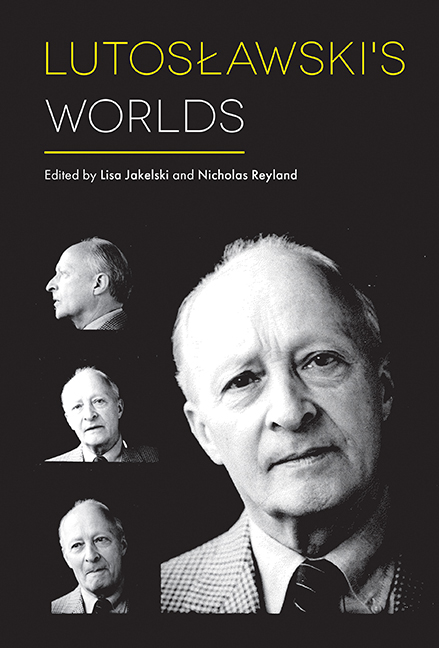Book contents
- Frontmatter
- Dedication
- Contents
- List of Figures
- List of Tables
- List of Music Examples
- List of Contributors
- Acknowledgements
- Introduction
- PART I mourning, modernism, and genius
- PART II other lutoslawskis
- PART III documents
- PART IV political engagement
- PART V legacies
- 13 Lutoslawski, Revived and Remixed
- 14 Heart and Brain, Tradition and Modernism: Lutoslawski and the Continuing Story of Harmony
- Bibliography
- Index
13 - Lutoslawski, Revived and Remixed
from PART V - legacies
Published online by Cambridge University Press: 14 June 2019
- Frontmatter
- Dedication
- Contents
- List of Figures
- List of Tables
- List of Music Examples
- List of Contributors
- Acknowledgements
- Introduction
- PART I mourning, modernism, and genius
- PART II other lutoslawskis
- PART III documents
- PART IV political engagement
- PART V legacies
- 13 Lutoslawski, Revived and Remixed
- 14 Heart and Brain, Tradition and Modernism: Lutoslawski and the Continuing Story of Harmony
- Bibliography
- Index
Summary
The twenty-second of September, 2013, was a busy date on the calendar of events to celebrate the centenary of Witold Lutosławski's birth. That evening, Krystian Zimerman played the Piano Concerto in Warsaw with Poland's National Philharmonic Symphony Orchestra. At the same time, a different tribute to the composer, called Polish Icons 2, was taking place in Kraków: electronic musicians were juxtaposing their re-workings of Muzyka żałobna and Preludes and Fugue with the AUKSO Chamber Orchestra's acoustic renditions of Lutosławski's original pieces.
On the surface, these events may seem to have little in common. Zimerman played in a standard concert hall; the musicians of Polish Icons 2 performed in the former electro-galvanizing plant of ArcelorMittal, Poland's largest steel producer. One concert professed a reverential attitude to the composer's score; the other featured musicians who quite literally took Lutosławski's music apart and used it to create something new.
The festivals at which these performances took place further amplified their differences. Zimerman performed during the Warsaw Autumn International Festival of Contemporary Music, the oldest institution of its kind in Poland. Launched by the Polish Composers’ Union (Związek Kompozytorów Polskich, ZKP), the Warsaw Autumn has treated audiences since 1956 to an eclectic (yet, stylistically speaking, predominantly modernist) array of art music from all over the world. The festival has played a key role in shaping Polish composers’ careers, Lutosławski's included. Polish Icons 2, by contrast, was part of Sacrum Profanum, an event sponsored by the Kraków Festival Bureau that has occurred annually since 2003. Sacrum Profanum's approach to programming departs from the Warsaw Autumn model. Instead of privileging art music, its professed mission is ‘to blur the boundary between contemporary [classical] music, which is often perceived to be difficult and incomprehensible, and the achievements of the ambitious experimental-pop scene’. According to journalist Jacek Skolimowski, Sacrum Profanum's blend of aesthetic and consumer values ‘has, for the first time in Poland, succeeded in bringing ambitious contemporary music to a broader audience’.
With that assessment, Skolimowski implied that the Sacrum Profanum had managed to achieve something that had eluded the Warsaw Autumn throughout its long history. And he has not been the only one to view the festivals as rivals.
- Type
- Chapter
- Information
- Lutoslawski's Worlds , pp. 303 - 332Publisher: Boydell & BrewerPrint publication year: 2018

